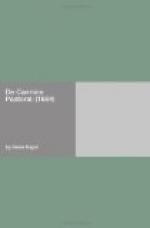The influence of Rapin on the development of the pastoral,
nevertheless, was salutary. Finding the genre
vitiated with wit, extravagance, and artificiality,
he attempted to strip it of these Renaissance excrescencies
and restore it to its pristine purity by direct reference
to the Ancients—Virgil, in particular.
Though Rapin does not have the psychological insight
into the esthetic principles of the genre equal to
that recently exhibited by William Empson or even
to that expressed by Fontenelle, he does understand
the intrinsic appeal of the pastoral which has enabled
it to survive, and often to flourish, through the
centuries in painting, music, and poetry. Perhaps
his most explicit expression of this appreciation is
made while he is discussing Horace’s statement
that the muses love the country:
And to speak from the very bottome of
my heart... methinks he
is much more happy in a Wood, that at
ease contemplates this
universe, as his own, and in it, the Sun
and Stars, the
pleasing Meadows, shady Groves, green
Banks, stately Trees,
flowing Springs, and the wanton windings
of a River, fit
objects for quiet innocence, than he that
with Fire and Sword
disturbs the World, and measures his possessions
by the wast
that lys about him (p. 4).
Rene Rapin (1621-1687), in spite of his duties as a Jesuit priest and disputes with the Jansenists, became one of the most widely read men of his time and carried on the celebrated discussions about the Ancients with Maimbourg and Vavasseur. His chef-d’oeuvre without contradiction is Hortorum libri IV. Like Virgil, Spenser, Pope, and many aspiring lesser poets, he began his literary career by writing pastorals, Eclogae Sacrae (1659), to which is prefixed in Latin the original of “A Treatise de Carmine Pastorali.”
J.E. Congleton
University of Florida
Reprinted here from the copy owned by the Boston Athenaeum by permission.
* * * * * * * * * * * * * *
A
TREATISE
de CARMINE PASTORALI
Written by RAPIN.
The First Part.
To be as short as possible in my discourse upon the present Subject, I shall not touch upon the Excellency of Poetry in general; nor repeat those high Encomiums, (as that tis the most divine of all human Arts, and the like) which Plato in his Jone, Aristotele in his Poetica, and other Learned men have copiously insisted on: And this I do that I might more closely and briefly pursue my present design, which, no doubt will not please every man; for since I treat of that part of Poetry, which (to use Quintilian’s words,) by reason of its Clownishness, is affraid of the Court and City; some may imagine that I follow Nichocaris his humor, who would paint only the most ugly and deform’d, and those too in the meanest and most frightful dress, that real, or fancy’d Poverty could put them in.




